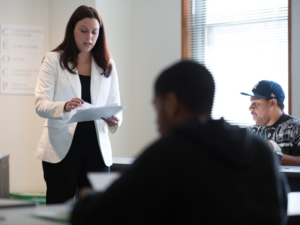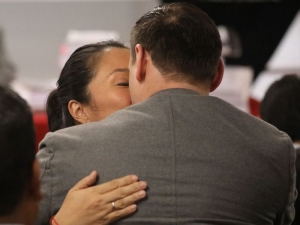Managing Director Mindy Tarlow on How Criminal Justice Reform can Unlock Economic Mobility
Q: What is the Justice and Mobility Fund’s strategy for change?
Mindy: Justice and Mobility seeks opportunities to both reduce and mitigate the impact of the justice system on people’s economic mobility. Let me unpack that statement a bit. First, the reason we anchor on both “reducing” and “mitigating” impact is that, while it’s incredibly important to reduce the flow of people into the system, we also need to mitigate the damage that’s been done to people who have already been through it, and that number is huge. Right now, 77 million adults in America have a criminal record. So, if we focus just on reducing the number of people entering the system, we risk leaving behind the tens of millions who are already bearing the system’s scars – from the everyday stigma of a criminal record to the long-lasting trauma and consequences of even a short period of imprisonment.
Second, we’re focusing squarely on those interventions most conducive to promoting economic mobility. Removing barriers to and advancing economic opportunities for individuals, their families, and entire communities are the cornerstones of our strategy. To do this, we are looking both across the system and across types of interventions to identify the biggest drivers of economic mobility:
- We’re not anchoring our work on one part of the justice system…for instance, only on diverting people before they enter the system, or only on supporting community reentry efforts. We’re looking for solutions at multiple touchpoints that have the potential to boost economic mobility.
- And those solutions can take different forms…For example, you can provide a direct service that finds people jobs, or you can push for policies that lift bans on the jobs you can get if you have a criminal record. Same idea, just different strategies.
Finally, we’re not just making nationwide investments – we’re making place-based investments as well and see key opportunities for state-level work to inform and influence the national work, and vice-versa. To date, we’ve invested in two states – Michigan and Oklahoma – that can surface local innovations that, if successful, could scale to other places. And where it makes sense, we are bringing a national lens to that work. For example, the Center for Employment Opportunities (CEO) has a longstanding presence in Oklahoma, and through our recent Justice and Mobility investment, is collaborating with a local nonprofit that can help advance skills of CEO clients, setting them up for better, higher-paying jobs.
opportunities for state-level work to inform and influence the national work, and vice-versa. To date, we’ve invested in two states – Michigan and Oklahoma – that can surface local innovations that, if successful, could scale to other places. And where it makes sense, we are bringing a national lens to that work. For example, the Center for Employment Opportunities (CEO) has a longstanding presence in Oklahoma, and through our recent Justice and Mobility investment, is collaborating with a local nonprofit that can help advance skills of CEO clients, setting them up for better, higher-paying jobs.
Q: You’ve spent many years working in the social sector — what do you think this means for leaders in this space?
Mindy: I think most nonprofit leaders – particularly in the justice arena, which has been woefully under-resourced for decades – live in six-month increments. It’s hard to plan ahead because you spend so much energy just trying to stay in place…I remember this so vividly when I was heading a nonprofit organization. I used to call it the “hummingbird syndrome” – it felt like I was flapping, flapping, flapping, but struggling to move forward, and I knew from talking to other leaders that I was far from alone.
There are so many extraordinary leaders in this space. The most important thing we in philanthropy can do is give them the resources and infrastructure they need to realize their visions. And by that I mean capital that’s longer term, larger, flexible, and that comes with the organizational strengthening, strategic planning, and capacity-building supports that position leaders to think and plan ahead, and be proactive and nimble as dynamics change and opportunities emerge.
Q: Say more about the employment strategy – why does this have the potential to spark major change?
Mindy: We started building our employment strategy like anyone would – looking at labor supply and employer demand, and how to remove barriers and frictions between the two. At that time, there was a tight labor market, employers were looking to hire, the economy was thriving.
And then COVID hit and everything flipped on its head. There was skyrocketing unemployment, a spiraling economy, businesses were struggling in many industries. We had to look at the same picture through the exact opposite lens. We really had to pull up and think, “How do we address this crisis in a way that ensures an equitable and inclusive recovery that doesn’t leave justice-involved people behind? What can we do right now to help us move toward a ‘new normal’ where folks have access to skill-building, access to jobs, and fewer barriers to both as part of post-pandemic recovery?”
We are working to create economic mobility for justice-impacted people, whether it’s through the Clean Slate Initiative expunging criminal records, the Alliance for Safety and Justice advocating for decarceration and shifting resources to communities, the Vera Institute of Justice helping to eliminate the ban on Pell grants for incarcerated students, or the Center for Employment Opportunities providing paid work experience for people exiting the system. These strategies are complementary and, taken together, have the potential to create lasting impact.
 At the same time there are people and initiatives stepping up to create fair chance hiring practices for justice-impacted people in ways that are synergistic: industry leaders like JP MorganChase are setting a national example with hiring commitments; employers across the US are pledging support through a national Second Chance Business Coalition; the Society for Human Resource Management has created Fair Chance Hiring certification to help those companies committed to building the skills and systems to recruit and retain justice-involved people; and, through our Justice and Mobility support, Jobs for the Future has convened employers and industry associations to share promising practices among peers.
At the same time there are people and initiatives stepping up to create fair chance hiring practices for justice-impacted people in ways that are synergistic: industry leaders like JP MorganChase are setting a national example with hiring commitments; employers across the US are pledging support through a national Second Chance Business Coalition; the Society for Human Resource Management has created Fair Chance Hiring certification to help those companies committed to building the skills and systems to recruit and retain justice-involved people; and, through our Justice and Mobility support, Jobs for the Future has convened employers and industry associations to share promising practices among peers.
We have an opportunity to do something significant at scale that can unlock the potential for justice-involved people to thrive. We have barriers to remove; we have skills to build; we have narratives to shift. But at the end of the day, if employers don’t make significant commitments around fair chance hiring, it will be for naught…like what they say about a tree falling in the forest when there’s no one around to hear it. If we are to truly achieve transformative systems change, we must be a country where it is mainstream practice to hire and advance people, regardless of justice involvement.
Q: Before coming to Blue Meridian Partners, you worked in the criminal justice field for over 30 years, within both city government and nonprofits. How does your past experience inform this work?
Mindy: My career has really, in many ways, had an uninterrupted focus on equity and justice. My earliest experience was in New York City’s Office of Management and Budget, where I was a senior analyst in criminal justice focusing on probation and alternatives to incarceration. That experience showed me how much damage the criminal justice system can do to individuals, families, and communities and that alternatives to incarceration are so much better, fairer, and – since this was the budget office – significantly cheaper! I saw that it was possible to avoid spending on incarceration and support alternatives instead. And to a young person just starting out, being part of making these equitable choices left an indelible mark on me. So, when people later said, “You could never take resources from the justice system and put them into the community,” I would say, “Yes, you can. Yes. You. Can.”

Later, when I had the privilege of running the Center for Employment Opportunities, I was able to see the transformational change that can happen when people return from prison to communities. I saw how when people are given the right support at the right time, they can begin to shift their lives into something that’s leading to not just freedom, but to opportunity and a pathway to economic mobility.
I find myself reflecting on how far we’ve come in the decades that I’ve been in the field and think we’ve made huge headway from where I started. I really believe we’re at a defining moment in America. There’s so much more to do, and the moment is upon us.

Mindy Tarlow leads Blue Meridian’s Justice and Mobility Fund. She provides strategic leadership on critical business priorities, explores new philanthropic investment opportunities, oversees and conducts due diligence on potential investees, and manages relationships with current investees. She also manages Blue Meridian’s overall evidence and evaluation practice. Previously, Mindy served as the Director of the Mayor’s Office of Operations in New York City and spent close to 20 years as the founding Executive Director of the Center for Employment Opportunities (CEO), having managed CEO’s successful spinoff from the Vera Institute for Justice.